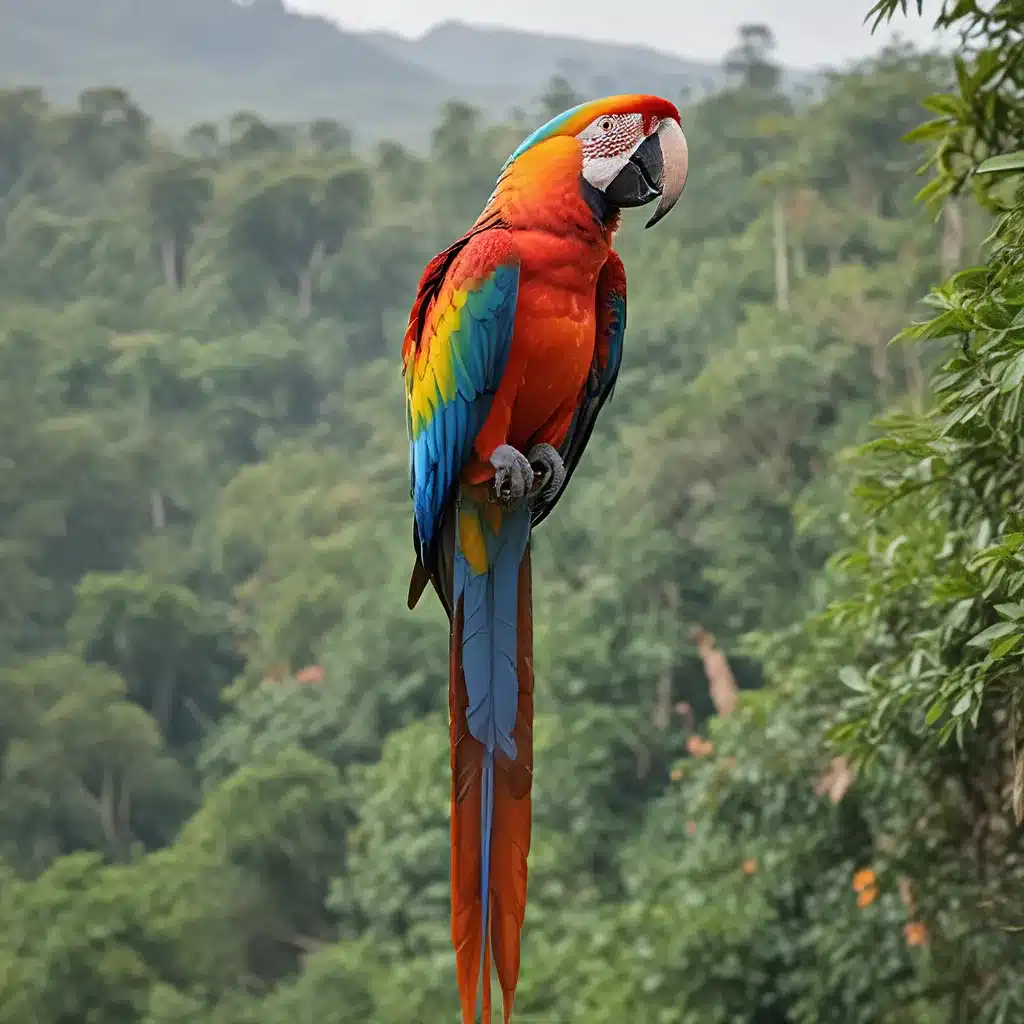
Macaws: Nature’s Riotous Rainbows
Picture this: you’re strolling down a sun-dappled path, the warmth of the tropics caressing your skin, when suddenly, a raucous cacophony erupts overhead. Lifting your gaze, you’re met with a breathtaking sight – a flock of macaws, their vibrant plumage ablaze against the lush green canopy. These avian marvels, with their captivating colors and boisterous personalities, have a way of claiming our attention and sparking a sense of childlike wonder.
As an exotic pet enthusiast, I’ve long been captivated by the allure of these magnificent creatures. Their sheer beauty is enough to stop you in your tracks, but delve deeper, and you’ll uncover a world of fascinating behaviors and adaptations that make macaws truly one-of-a-kind. From their intricate social dynamics to their remarkable intelligence, these feathered friends have a way of capturing our hearts and minds.
Macaws: Rainforest Royalty
To truly appreciate the grandeur of macaws, we must first understand the environments they call home. These flamboyant birds are native to the lush rainforests of Central and South America, where they thrive amidst the verdant foliage and towering canopies. As I’ve experienced in my travels, the mere sight of a macaw flock can bring a sense of awe and tranquility, momentarily transporting us to a world where the natural order takes precedence.
Macaws are the true royalty of their realm, commanding attention with their sheer size and vibrant hues. The largest members of the parrot family, these majestic birds can reach up to 40 inches in length, with wingspans that can stretch over 3 feet wide. Their distinctive beaks, strong and curved, are designed to crack open the toughest nuts and seeds, while their powerful talons allow them to navigate the intricate branches of their arboreal domain.
The Vibrant Diversity of Macaws
But macaws are not a monolith; rather, they come in a dazzling array of colors and subspecies, each with its own unique charm. From the iconic scarlet macaw, with its brilliant crimson plumage, to the striking blue-and-gold macaw, with its stunning contrast of azure and golden hues, these birds are a true feast for the eyes.
As I witnessed at the Parque das Aves in Brazil, the macaw enclosure was a veritable riot of color, with scarlet, blue-and-gold, and red-and-green macaws perched side by side, their feathers shimmering in the sunlight. It was a mesmerizing display, one that left me in awe of the sheer diversity and beauty of these remarkable creatures.
The Intelligence and Sociality of Macaws
But macaws are more than just a feast for the eyes; they are also incredibly intelligent and highly social creatures. As I learned during my visit to Macaw Mountain, these birds are known for their problem-solving skills, their ability to mimic human speech, and their strong familial bonds.
Macaws are highly intelligent, with brains that are proportionately larger than those of many other bird species. This intelligence manifests in their ability to solve complex problems, such as navigating intricate mazes or manipulating objects to obtain food. Their capacity for language acquisition is also remarkable, with some macaws able to mimic a wide range of sounds, including human speech.
Perhaps even more striking, however, is the strong social structure of macaw communities. These birds are highly social, living in close-knit family groups and forming deep bonds with their mates and offspring. They engage in a variety of communication behaviors, from raucous squawking to gentle preening, all of which serve to strengthen their social ties.
The Threats Facing Macaws
Sadly, despite their grandeur and captivating nature, macaws face a number of threats to their survival. Habitat loss, driven by deforestation and human encroachment, is one of the primary challenges these birds face. As their rainforest homes are cleared for agricultural or residential development, macaws are left with dwindling resources and limited nesting sites.
Additionally, the illegal pet trade poses a significant threat to wild macaw populations. The allure of these stunning birds has led to a thriving black market, with poachers capturing and selling them as exotic pets. This, coupled with the challenges of caring for macaws in captivity, has resulted in dwindling numbers in the wild.
Conserving the Majestic Macaw
But there is hope for the future of these magnificent creatures. Dedicated conservation efforts, both in the wild and in captivity, are working to protect and restore macaw populations. Organizations like the World Parrot Trust and the Ara Project are leading the charge, working to establish protected habitats, combat poaching, and educate the public about the importance of macaw conservation.
In captivity, responsible exotic pet owners and accredited breeding programs are playing a vital role in preserving macaw lineages and promoting awareness about these remarkable birds. By providing proper care, enrichment, and educational opportunities, we can help bridge the gap between the wild and the domestic, ensuring that future generations can marvel at the grandeur of the macaw.
Embracing the Macaw’s Magnificence
As I reflect on my own encounters with these feathered marvels, I’m struck by the profound sense of wonder and connection they evoke. Whether it’s witnessing a flock of macaws soaring overhead or observing their intricate social interactions, these birds have a way of captivating our senses and sparking our imagination.
In a world that often moves at a breakneck pace, the macaw serves as a reminder to slow down, to immerse ourselves in the beauty of the natural world, and to cultivate a deeper appreciation for the incredible diversity of life that surrounds us. So the next time you have the chance to encounter a macaw, whether in the wild or in captivity, I encourage you to pause, to observe, and to let your sense of wonder be sparked anew.
After all, what could be more magnificent than a macaw?

